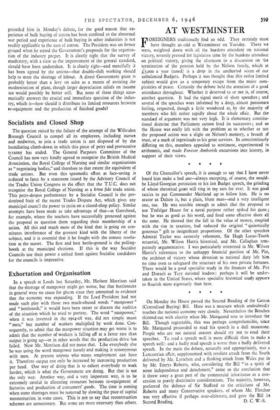AT WESTMINSTER
FOREIGNERS traditionally find us odd. They certainly must have thought us odd at Westminster on Tuesday. There we were, weighted down with all the burdens attendant on national victory, severely pressed for legislative time by the burdens attendant on political victory, giving the afternoon to a discussion on the termination of the pension held by the Nelson family, which at £5,000 a year (taxed) is a drop in the uncharted ocean of our unbalanced Budgets. Perhaps it was thought that this rather limited subject would give us a temporary escape from the major com- plexities of peace. Certainly the debate held the attention of a good attendance throughout. Whether it deserved to or not is, of course, another question. It had the signal merit of short speeches ; and several of the speeches were informed by a deep, almost passionate feeling, respected, though a little wondered at, by the majority of members who felt rather tepidly about the whole affair. But the standard of argument was not very high. It is elementary constitu- tional doctrine that Parliament cannot bind its successors; and so the House was really left with the problem as to whether or not the proposed action was a slight on Nelson's memory, a breach of trust, or a mark of ingratitude to his great services. In conscientiously differing on this, members appealed to sentiment, experimented in arithmetic, and made Forever Amberish excursions into history, in support of their views.
Of the Chancellor's speech, it is enough to say that I have never heard him make a bad one—always excepting, of course, the would- be Lloyd Georgian peroration to his last Budget speech, the grinding of whose rhetorical gears will ring in my ears for ever. It was good tactics to put Commander Maitland up to follow him. He is no orator as Dalton is, but a plain, blunt man—and a very intelligent one, too. He was sensible enough to admit that the proposal to use Trafalgar House for a naval purpose rather spiked his guns ; but he was as good as his word, and fired some effective shots all the same. He showed that the fall in the value of money, coupled with the rise in taxation, had reduced the original "quixotically generous" gift to insignificant proportions. Of the other speeches Admiral Taylor was earnestly vehement, Sic Hugh Lucas-Tooth actuarial, Mr. Wilson Harris historical, and Mr. Callaghan tem- perately argumentative. I was particularly interested in Mr. Wilson Harris's references to the unhappy financial position of Mr. Pitt, the architect of victory whose devotion to national duty left him no time even to safeguard the structure of his own private fortunes. There would be a good specialist study in the finances of Mr. Pitt and Disraeli as Tory national leaders: perhaps it will be under- taken in the United States, where specialist historical study appears to flourish more rigorously than here.
On Monday the House passed the Second Reading of the Cotton (Centralised Buying) Bill. Here was a measure which undoubtedly touches the national economy very closely. Nevertheless the Benches thinned out with alacrity when Mr. Marquand rose to introduce the Bill. Though regrettable, this was perhaps comprehensible, since Mr. Marquand proceeded to read his speech in a dull monotone. People who are not natural orators should try not to read their speeches. To read a speech well is more difficult than to make a speech well: and a badly read speech is worse than a badly delivered speech. In the main the debate, naturally and appropriately, was a Lancastrian affair, supplemented with resolute attack from the South delivered by Mr. Lyttelton and a flanking attack from Wales put in by Mr. Emrys Roberts, who, considering the Bill "in a spirit of some independence and detachment," came to the conclusion that it threw away a great part of the commercial inheritance as a con- cession to purely doctrinaire considerations. The majority, however, preferred the defence of Sir Stafford to the criticisms of Mr. Roberts and many Conservative speakers, of whom Mr. Fletcher was very effective if perhaps over-elaborate, and gave the Bill its


































 Previous page
Previous page